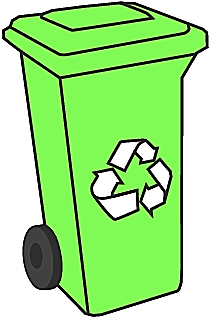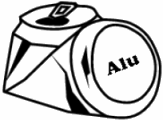Close
- Glass makes up 7 per cent of the total UK household waste consumption.
- So far, glass that can be recycled includes bottles and jars.
- Currently in the UK 50 per cent of glass is recycled.
- The use of soda-lime glass for most of manufactured glass products requires the primary ingredients to be quarried from our landscape.
- One tonne of cullet (broken / waste glass suitable for recycling) saves 1.2 tonnes of raw material and 315kg CO2 emissions
Close
- Plastics make up 7 per cent of total UK household waste consumption
- So far, there are seven different types of plastics that can be recycled: (1) PET; (2) HDPE; (3) PVC; (4) LDPE; (5) PP; (6) PS (7) OTHER.
- Currently in the UK only 7 per cent of plastics are recycled (although 95% of process scrap).
- Approximately 4 per cent annual oil production is used for feedstock for plastics production and a further 3-4 per cent during manufacture.
- Using recycled polyethylene carrier bags as opposed to new products saves 67 per cent energy consumption; 67 sulphur dioxide production; 50 per cent nitrous oxide; 90 per cent water usage; 60 per cent CO2 emissions and for every tonne, saves 1.8 tonnes of oil.
- 17.5 billion plastic bags are given away in the UK ever year - that's 290 bags per person.
Close
- Paper and card make up 18 per cent of total UK household waste consumption
- Types of paper that are recyclable include newspapers, magazines, telephone directories, junk mail, office paper, cardboard, other packaging papers, mixed/coloured paper.
- Currently in the UK 57 per cent of paper is recycled.
- If paper is not recycled, but simple land-filled and left to rot, it emits methane, which is 20 times more potent a greenhouse gas than CO2.
- Processing recycled paper consumes 28-70 per cent less energy and provides 95% less air pollution than virgin paper. For every tonne of recycled paper, 30,000 litres of water and 3,000 - 40,000 kWh of electricity are saved.
- Recycled paper made up 75.5 per cent of raw material for UK newspapers in 2004.
Close
- Aluminium and steel make up 8 per cent of total UK household waste consumption
- The most common recyclable aluminium products are drinks cans although aluminium foil, pie moulds and garden furniture can also be recycled.
- Currently in the UK 33 per cent of aluminium is recycled.
- Aluminium can only be found in the compound, alumina. This alumina has to be stripped off its oxygen in order to free the aluminium.
- Recycled aluminium uses just 5 per cent of the energy and produces only 5 per cent of the CO2 emissions of that needed for virgin materials. 1 kg of aluminium saves 6 kg of bauxite, 14 kWh of electricity and 4 kg of chemical products.
- It takes just 6 - 8 weeks for a can to be recycled and be back on the shelf and the energy saved from recycling one can is enough to power a TV for three hours.
- Aluminium foil and aluminium cans are made of different alloys and must therefore be collected separately.
Close
- Aluminium and steel make up 8 per cent of total UK household waste consumption
- Steel products that can be recycled include old car parts, household appliances, food packages and other containers.
- Currently in the UK 70 per cent of steel is recovered.
- Steel is mined from iron ore. Although plentiful, the iron ore is combined with oxygen, which has to be removed.
- 1 tonne of recycled steel saves 1.5 tonnes of iron ore and 0.5 tonnes of coal.
- Steel is easy to identify within the recycling process because of its magnetism.
Click on the icons for recycling facts.






